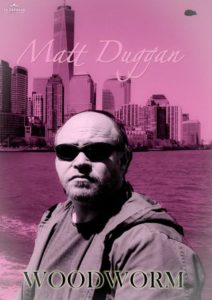Woodworm is the name given to the larvae of a fairly wide array of beetles. It’s also the name applied to a condition of wood where the larvae have had a meal. What looks like holes is more like entrances to small caves, carved into the wood as the larvae eat their way forward.
But the title of a poetry collection?
I saw the name of British poet Matt Duggan’s latest poetry collection, Woodworm, however, and thought not of wood beetles but of Wormwood, the young student being tutored in The Screwtape Letters by C.S. Lewis. Both thoughts might be relevant, however. Duggan writes about the individual and collective flaws that, sometimes slowly and sometimes quickly, eat their way through ourselves and our culture. And, like Lewis’s Wormwood, in these 60 poems we are being taught not how to promote and capitalize upon the flaws, but more to be aware of the havoc the worms of our culture are creating.
Duggan has written dystopian poems before; an entire collection is entitled Dystopia 38.10. The poems of Woodworm are not about dystopian themes. It’s almost as if they are the precursors to Dystopia 38.10.
The 60 poems are evenly divided into two sections. Part One is entitled “The Pursuit for Truth in a Future We Didn’t Expect.” Part Two is “Questioning Sanity in a Post-Truth Age.” Those titles suggest political ideas, and overt political themes can be found in some of them. But the woodworms are gnawing at more than the political; they are boring through the personal as well.
Tenderness

watch the glass start to expand
place a lid or plate over its circular top;
Hear the slowing beat pulsate
allow oxygen to circulate. The heart
will become an unripe cactus fresh and cold,
bulging in liquid with hairs and horns
a tenderness revealed to all.
Show us that the moon is broken
peel away the broken glass
from the light that shatters;
Place the brightness inside
where the repletion of the dark
limps like a broken smile laid to rest.
Show me the sunset not the mouth
covering the concrete owl. The heart
that lay in tenderness waits to escape.
The heart becomes an unripe cactus; the moon, symbol of immortality or eternity, is broken.

Matt Duggan
Similar ideas run through all of the poems. Whether Duggan is writing about New York City, a kingfisher diving in the water, illness, or swimming, the woodworms are at work. The title poem, a prose poem, speaks of the “guarded secret of the murmuring worms,” and says, “We see the damage it’s done on the surface never see inside or beneath the carnage it unleashed.” The supports holding society together are being eaten away, and all we see is the surface damage. Underneath, it’s far worse.
Duggan was born in Bristol, England, in 1971 and lives there today. His poems have appeared in numerous online and print journals, including Indiana Voice Journal and Ink Sweat and Tears. He started and still hosts a spoken word evening at the Hydra Bookshop in Bristol. His Dystopia 38.10 won the 2015 Erbacce prize for poetry.
Wormwood doesn’t make for light reading, but then Duggan has never been one to shy away from the passions he feels and the warnings he’s compelled to give. It’s a voice we’d do well to heed.
Related:
Matthew Duggan’s “Underworld: The Modern Orpheus”
Poets and Poems: Matt Duggan and “Dystopia 38.10”
Poets and Poems: Matt Duggan and “One Million Tiny Cuts”
Poets and Poems: Matt Duggan and “A Season in Another World”
Photo by Dianne Rosete, Creative Commons, via Flickr. Post by Glynn Young.
__________________________

“I require all our incoming poetry students—in the MFA I direct—to buy and read this book.”
—Jeanetta Calhoun Mish
- Poets and Poems: The Three Collections of Pasquale Trozzolo - September 11, 2025
- Poets and Poems: Boris Dralyuk and “My Hollywood” - September 9, 2025
- When You Don’t Speak Czech or German - September 4, 2025

Maureen says
‘a broken smile laid to rest’ : What an image of loss, of relationship come to an end. Yet, ‘the heart that lay in tenderness waits to escape’ – there is resilience and recovery.
Matt Duggan says
Thank you,
The book also has a 3D cover with artwork, and is now on its second press, signed copies are available via PayPal.
Sandra Heska King says
I’ve read that poem several times and am kind of stuck on that heart being imprisoned in glass. I’m also kind of stuck on the fact that Duggan was born in 1971–the year I was married.